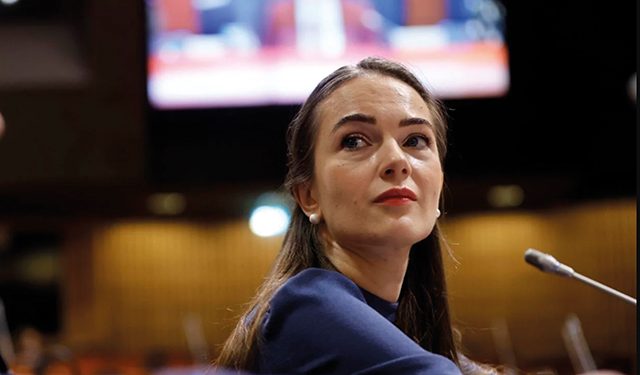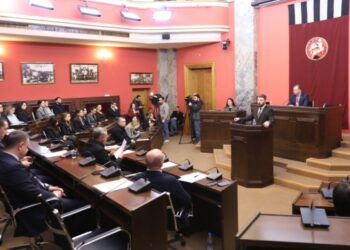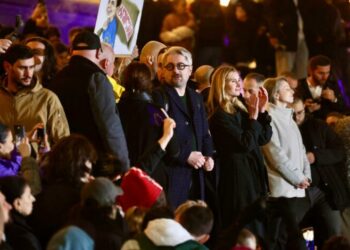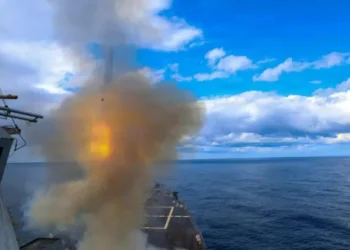Oleksandra Matviychuk is the director of the Center for Civil Liberties, the Ukrainian NGO that shared the 2022 Nobel Peace Prize for its work documenting alleged Russian war crimes.
In a wide-ranging interview with the RFE/RL Georgian Service, Matviychuk, a lawyer and human rights activist, said Russia’s full-scale invasion of Ukraine was the result of decades of impunity for the Kremlin. She said Russian President Vladimir Putin and other high-ranking officials must ultimately be brought to justice, while acknowledging that the process is likely to be lengthy.
The interview with Matviychuk was conducted on January 26 in Strasbourg, France, on the sidelines of the winter session of the Parliamentary Assembly of the Council of Europe.
“The war changed our lives completely,” she tells us. “From the private perspective, every single aspect of what we call normal life was ruined. Now there is no safe place in Ukraine where you can be safe from Russian rockets. We live in total uncertainty- you can’t plan your day, even next hours, because you never know when the siren will blare, or the electricity will cut off.
“From the professional point of view, I was documenting Russian war crimes for eight years before the large scale invasion started, but I wasn’t prepared for this level of atrocities. I don’t think you can be prepared for war. We’re faced with enormous cruelty and an enormous amount of war crimes; we’re faced with an enormous scope of human pain. We don’t just document violations of the Geneva Conventions; we document human suffering.
What is this mission to document Russian war crimes like to carry out? What is it you and your team have to go through, doing the work you do?
It’s difficult. I’m a human rights lawyer, but first and foremost I’m a human being. And we now work with something inhuman. It’s very difficult to get used to.
Ukraine’s General Prosecutor gave you 71,000 accounts of war crimes. How does it make you feel to know that some who committed those crimes might go unpunished?
I can’t predict the future, but I can do everything for the future I want to happen. It’s a huge responsibility. I’ve been documenting the stories of people who survived Russian captivity. Horrible stories. They tell me how they were beaten, raped; how their fingers were cut, how their nails were torn out, how they were tortured with electricity, all the horrible details, how they begged not to be beaten anymore, but to be killed so the torture would end. And I always ask them to apply to national investigators or to international organizations, and a lot of them say “no, we have no hope. We have no hope that our perpetrators in the occupied territories will be arrested, the international system is not capable,” etc. But they come to me, just a human rights defender, because they still have hope that justice is possible. They want their story recorded, not to vanish. I want their expectations to be achieved.
Is there a story you wish you’d never heard, that you’d like erased from your mind?
When your perception of what is normal is ruined, you see the things you thought were essential are not essential at all. There are only a few things that are really important in life, values for which you can live, fight and even die for. And I told myself: In future, I want to forget a lot of things which I’ve heard and felt during this war, I don’t want to carry this war inside me for the rest of my life. But I do want me to remember those essentials. It’s a very important lesson learned.
I never want any nation to go through this experience, but these dramatic times have given us Ukrainians a chance to express our best features, to fight for freedom, to be courageous, to make tough but correct choices, and to help each other. When the invasion started, international organizations evacuated their staff, but ordinary people remained. They started to risk their lives to defend and help others who they’d never met before. Now, like never before, we are acutely aware of what it means to be human beings.
Do you see any similarities between Russian military strategies used in Ukraine and ones they used elsewhere?
All that we face in Ukraine is a result of the total impunity Russia enjoyed for decades. Russian troops committed horrible atrocities in Chechnya, in Georgia, in Moldova, in Mali, in Libya, in Syria, elsewhere. They have never been punished. This brutality, cruelty, and this ignorance of international law and basic human rights; this rejection of human dignity, have become a part of Russian culture. One example: When the invasion started, we got a message from my colleague from Syria, and they said, “please tell your authorities they should never mark medical workers as medical workers or hospitals as hospitals, or evacuation cars with the label children, because the Russians will deliberately hit them.” It happened: A Russian pilot dropped a bomb on the Mariupol Drama Theater, where in big letters “children” was written. Russia destroyed that drama theater.
Over the past 8 years you sent dozens of reports to the UN, OSCE, Council of Europe, and European Parliament, but they didn’t listen. Now they are listening. What action should follow?
Even when you are heard, international systems may not be capable of doing anything. It’s an illusion that an international system of peace and security exists. It doesn’t. The whole UN system couldn’t stop the Russian atrocities. When the UN Sec Gen came to meet President Zelensky, a Russian rocket hit his residential building and killed a journalist from Radio Liberty. It’s a very dangerous world to live in, because it means that our security, our human rights guarantee, depends not on international order and international law, but only on whether or not you live in a country with strong military potential. It’s a very dangerous logic. We need to restore international order, to start a cardinal reform of this international system of peace and security in order to provide human rights guarantees and security for everyone, regardless of the country they live in. We have to provide people effective protection from authoritarian regimes, and from wars. And we have to start with a very small but symbolic step: We have to exclude Russia from the UN Security Council.
And how you propose to make this happen? The UN charter does not prescribe the expulsion of a permanent member from the Council.
We need to call for historical responsibility from the political leadership of these countries. Yes, they have different goals and there are governments which do not represent their people. But I look to the future with optimism, because, in my experience, I know that if you can’t rely upon a legal instrument, you can always rely upon people. Systematic strategic changes have been based on the involvement of ordinary people. During the Revolution of Dignity, when they coordinated civil initiative Euromaidan SOS, we provided assistance to prosecuted protesters throughout the country 24/7. And then we established an international network, and launched a global action to release political prisoner Oleg Sentsov and other Ukrainian political prisoners which were jailed by Russia, and then we united people in 35 countries, hundreds and hundreds of people all over the world who joined the global campaign. Justice is a very understandable value for millions of people around the globe, and in this regard, there are no national borders. Right now, there is not just a war between two states, it’s a war between two systems: Authoritarianism and democracy.
Last century, it was naive to think that an international organization could interfere with the internal state affairs of a sovereign state when that state violates human rights. Now, it’s the basic principle of international law. I’m a human rights lawyer and I know this legal system is not conservative: It can be developed, adapted to the appropriate needs. The main barrier is our minds.
Some say “justice is important, but we need peace, stability.” But we will never have peace in our region without justice, which means stable peace, not just a temporal political compromise which provides Russia the chance to regroup and then go further. We need a sustainable, stable peace which provides people the opportunity to live without fear of violence, and have a long perspective. Peace won’t be sustainable without justice, because in our region, Russia has been using war as a tool to achieve its geopolitical interests for decades. Russia has been using war crimes as a way to win their wars for decades. It will not break the circle of impunity; we’ll have another war, maybe not against the Ukrainian nation, but against another nation, and I want to prevent it.
You also say that we should not wait to bring Vladimir Putin to justice. How do you propose that should be done?
We have to establish a special tribunal on aggression to hold Putin, Lukashenko and other top military command and senior political leadership of the Russian Federation accountable. Even that is not enough, because when we speak about the crime of oppression, it’s only one type of international crime. We have war crimes, crimes against humanity, genocide. And when the International Criminal Court is limited to investigation only, to several select cases or war crimes, crimes against humanity and genocide, I have a very simple question: Who will provide justice for the hundreds of thousands of victims of this war who will not be lucky enough to be selected by the ICC? And the answer is the national system. But once again, 70,000 criminal proceedings is impossible to investigate even for the best national system in the world. And that’s why we need to find a hybrid model: National investigators working together with international investigators; national judges working together with international, and so on.
You could probably get thousands of people worldwide to hold rallies and demand that Putin be brought to justice. How close would that bring us to actually bringing Putin to justice?
When we did the Save Sentsov campaign, it wasn’t just protesting with abstract demands to Putin: We made a strategy. And people in 35 countries in the world, on one day, appeared in their central squares with the demand to their own national governments. We wrote what their national government had to do in order to push Russia to release the Ukrainian political prisoners. And people demanded it. This is the combination we need: The energy of the people and a strategy to push this energy in the right way. We need to be precise with our goals. We have to try.
When you received the Nobel Prize, did anything change in terms of the impact of your organization?
Yes. For decades, the voices of human rights defenders weren’t heard. We were invisible at the international level, at the national level. It was like a blind spot. The Nobel Peace Prize gave us an opportunity to make our voice tangible, and once again put on the table in the rooms where political decisions are made, that human rights and peace are inevitably linked, and we will have no peace without justice.
You said: “The majority of the Russian public has supported the war. Putin is merely seeking to satisfy the public’s desire for restoration of the Russian Empire.” Does that mean the link between Russians and Ukrainians, as peoples, is finally and irreversibly severed?
Recently, a study was done by a Ukrainian psychotherapist. Several focus groups were created and she asked people from whom they are waiting to be asked for forgiveness on the Russian side: From Putin, from the Russian government, from parliament, from the Russian intellectual elites, or from ordinary Russian people. In first place was the answer: From nobody. This means that Ukrainians want justice, they don’t want to be asked to forgive. We’re not waiting for “forgive us” from Russian people; we need justice done, and once it is, then they, as a result, can ask for forgiveness. The concept of forgiveness means you’re ready to forget what happened. Ukrainians are not going to forget. We need justice.
Are they going to forgive?
It’s possible, but only as a result of justice. You can forgive when you feel satisfied. And this is essential, because if the demand for justice isn’t responded to, it can turn into a demand for revenge.
Interview by Vazha Tavberidze for RFE/RL














